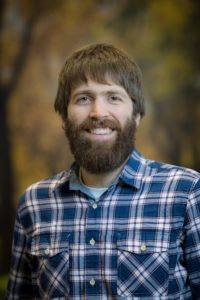In a special weekly series, the College of Liberal Arts is featuring a faculty member from one of our 13 departments. We asked questions about why they are passionate about the subjects they study and teach, and how they found their path to CSU. See all “Faculty Friday” features here.
 Ryan Scott
Ryan Scott
Assistant Professor, Department of Political Science
1. Why do you research and teach environmental policy? What do you like most about environmental and public policy? What inspired your interest in environmental policy?
I research environmental policy, particularly the use of policy instruments to address human health issues with energy technology. I am focused on air quality impacts as I was hired as part of the Partnership for Air Climate and Health, so I have a number of evolving projects concerning municipal air quality rules, oil and gas development, and impacts of energy development. I get to teach these topics in my classes which is really special.
Public policy scholarship is broadly applicable to a range of issue areas, and since I am trained as a policy scholar, I like that I can expand my horizons. Sometimes in class we talk about other things I’m interested in such as water, salmon, parks and open spaces, affordable housing, but, mostly we just talk about the environment. In some sort of way I’ve always been interested in the environment, and how humans can interact with it and shape it.
I used to think I was interested in history. I wrote my second grade short story on the history and purpose of Grand Coulee Dam. I used all three books our elementary school library had–what kind of library only has three books on dams? You could say I was destined for a career in environmental policy from an early age. Growing up near Puget Sound, my best memories are of time spent with my family hiking, crabbing, and walking the beach. I know now that those are critical actions for well-being, but it is vital to ensure we can do those activities safely and sustainably.
2. Which class is your favorite to teach and why?
POLS 460 Policy Process. One of my goals for the course is to use the study of policy processes as a lens to understand the often confusing world of public policy making. Admittedly, it is always a challenge for me to think about how I can take emerging discussions within the academic study of the policy process and make them applicable and relevant to the current interest of political science students. I am constantly impressed by the insights of CSU students and their ability to reason through complex policy issues using theories and frameworks. I’ve been trying a little experiment this year of making almost all of the cases we discuss about emerging issues in Colorado and the American West. Meanwhile, our textbook is largely academic rather than applied, so there is often translation and reapplication necessary. Our liberal arts students are an intelligent bunch and they apply the course concepts adeptly, bringing really good, new insights. Ultimately, teaching that class and hearing students’ comments, questions, confusion, and complaints has made me a much better researcher and teacher.
3. What did you want to be when you were little? When did you know you wanted to go into higher education/research?
I was definitely going to be a cartographer. I actually still secretly want to be a cartographer. Can we start a Department of Cartography and draw maps all day?
I have to thank Dr. Jeff Sanders and Washington State University for pushing me in the direction of higher education and research. I took a graduate seminar with him when I was an undergraduate history major and I loved every aspect of it. I ended up in graduate school for public policy after writing my honors thesis on asbestos policy. Working on that project, I fell in love with understanding the interactions between humans and the environment, especially as it relates to health.
4. How did you get to CSU?
2005 Honda Element. It broke down in Boise half way between graduate school at the University of Washington and here, so it’s good I’m not still somewhere in Idaho.
5. What is one thing students would be surprised to learn about you?
I’m not a very surprising person… maybe that I really like baking and cooking? I’m going to quit writing this because I need to go make dinner actually. We are going to have fish I think, but I’m not really sure what I should do to the fish yet. I made fish pie last week so maybe we’ll run that back!